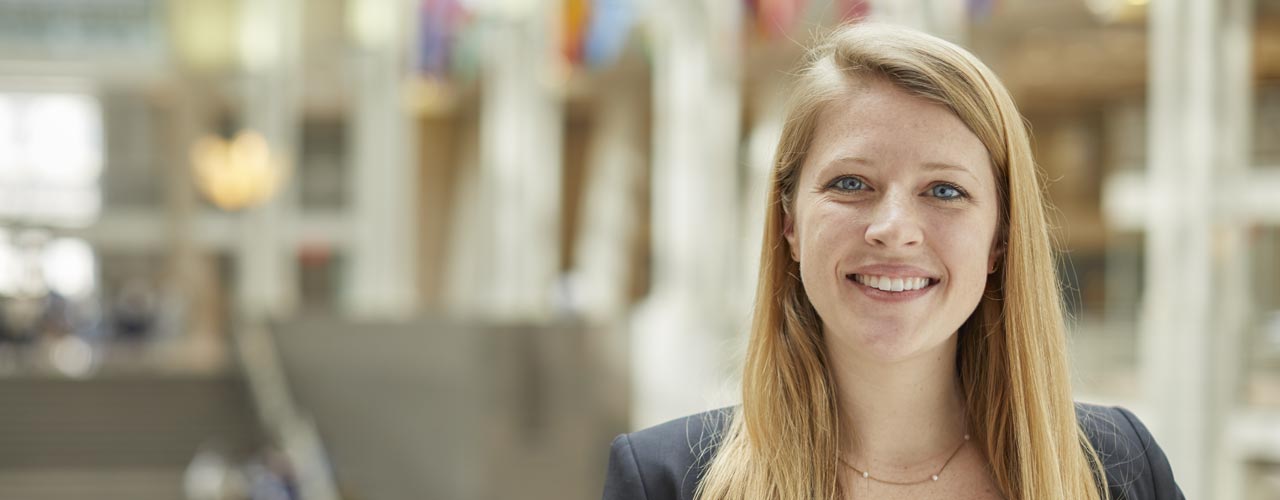
MPH, Hubert Department of Global Health
Policy Research Associate, Center for Health and Gender Equity (CHANGE)
“I want to be a part of positive change that lifts people up who have traditionally been silenced. Having the experiences that I’ve been lucky enough to have, both in the U.S. and internationally, has been a huge, important part of shaping my career in global health.”
When she was 22, Samantha Luffy was leading ecological tour groups in a remote Costa Rican rainforest when her world-view cracked open. The daughter of a military family, she was used to frequent relocations and adjusting to foreign environments, but this was different. The day-to-day challenges of living in a place without electricity or easy access to food was eye-opening.
“It was completely mind-blowing for me to experience the way many people in our world live. I had the privilege of choosing to live in that environment versus people who are forced to walk miles every day to get water or food,” she says.
Her seven-month experience in Costa Rica helped solidify her decision to enroll at Rollins as an MPH student in the Hubert Department of Global Health. Determined to pursue and finance a Global Field Experience, Luffy worked closely with her thesis advisors (who also became her mentors), Roger Rochat and Dabney Evans, to identify a research partner in Latin America where there was demonstrated need to research unintended pregnancies among young women. With Rochat and Evans’ guidance, she designed a qualitative study in Nicaragua composed of focus groups and in-depth interviews where women could discuss their experiences surrounding unintended pregnancy in the context of Nicaragua’s national law that bans abortion in all circumstances – even in cases of rape, incest, or danger to the life of the pregnant person.
Once on the ground, Luffy was met with suspicion and, in some cases, hostility as she conducted her research. “I was banned from all of the public health facilities in the city by the medical director, so I wasn’t allowed to go into any of the clinics where I was supposed to recruit participants. I had to kind of recruit participants from the community directly,” she says. Despite the challenges, Luffy was able to gain the trust of women in the community and effectively complete her research. “It was one of the most valuable things that stands out in my career at Rollins. I feel like that experience opened the door to all of these professional accomplishments that I can now look back on and say, I did this from square one.”
Luffy returned with enough research to support three peer-reviewed manuscripts (of which she is first author) and her thesis (which was a Shepard Award finalist). The project also gave her the opportunity to practice her presentation skills before major audiences—she presented her findings at an American Public Health Association conference, a Population Association of America meeting, in a global health disparities course at her undergraduate alma mater, and in numerous classes at Rollins.
Luffy further developed her skills through a Rollins Earn and Learn position with Anne Spaulding’s research team as they worked to implement a rapid HIV testing protocol in Fulton County Jail. “I was part of the team that did all of the data management on the inside. It was still a really unique experience about what it means to test people for HIV in the community.”
Post-Rollins, Luffy found work as a contractor for USAID where she worked for several years as a program analyst providing technical, programmatic, and operational support to a large portfolio of biomedical HIV prevention technologies in clinical testing in India and Africa. Currently, she’s the Policy Research Associate for the Center for Health and Gender Equity (CHANGE) in Washington, DC.
“I want to be a part of positive change that lifts people up who have traditionally been silenced. Having the experiences that I’ve been lucky enough to have, both in the U.S. and internationally, has been a huge, important part of shaping my career in global health.”

